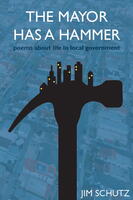
When I retired recently, I wanted a way to sing the praises of city managers and all local government professionals—to make “my people” feel seen, appreciated, and loved. I hoped to describe the indescribable nature of our work and make sense of the nonsensical.
I set out to capture all of it: the joys, the pains, the quiet frustrations, the small triumphs. My goal was to approach it with honesty, heart, and humor. I needed an art form that could convey “what it feels like” to be a local government leader today, with all the elevated and often conflicting emotions. I realized I wanted to write some love poems.
We turn to poetry during life’s most emotional moments—weddings, funerals, births—but it’s rarely found in the halls of government. To be or not to be would require 400 “whereas” clauses and several hours of debate. But poetry, somehow, felt right, save one hiccup: I wasn’t a poet.
Learning How
I’d written professional journal articles before, several in PM magazine, but never poetry. After more than 30 years in local government, the final eight as city manager in San Rafael, California, it all came pouring out. I’d take long hikes in the forest, dictating story after story into my phone, still needing to learn how to turn them into poems.
I signed up for a poetry class at my local community college. There, I was certain I’d learn to delight in Dickinson, marvel at Milton, wrestle with Whitman, and maybe even understand iambic pentameter. I arrived eager to take notes and study the great poets and their craft. Instead, the instructor began the class by asking, “Jim, you are new to class. Would you like to start us off?” Start us off? By doing what, exactly? It quickly became clear: this was a poetry workshop, and we were expected to bring original poems for feedback. By the next class, I was ready with my first poem, “The Mayor Has a Hammer.”
The First Poem
You know that feeling at a local government conference where even strangers feel like extended family living a parallel life? I wanted to find those commonalities that bind us as a profession and explore them. Where better to start than with a mayor who likes to flex their muscles?
As a city manager, I sometimes imagined the council or staff with an invisible tool belt holding all the tools they could bring to a particular challenge. Need to establish solid community relations? There are tools for that. Need to work cross-departmentally on complex problems like homelessness or climate change? There are tools for that.
My first poem was about the kind of mayor who just has one tool: the hammer. To every problem, their instinct is to start whacking at it with brute force; no finesse required. I wrote in one stanza of the poem:
The hammer dangles in a place of pride,
an only child, basking in importance.
The hammerhead reverently polished
by the mayor who loves this tool so much
there is no room for any other on his belt,
or in his heart.
At first, my poetry teacher would loudly call out “clang,” every time I used a word that sounded bureaucratic or governmental to him. He’d say, “That word does not exist in the world of poetry; that word lives in prose.” And after 30 years of writing staff reports, resolutions, and ordinances, I had a lot of bureaucratic words.
My challenge was to write narrative poems about government that would sing and dance like poetry instead of the dull monotone of a typical staff report or resolution. I also figured local government professionals don’t have time to dissect poems you need to read 10 times to understand. I wanted my poems to be accessible, so both poetry lovers and those who don’t give a hoot about poetry could find meaning in them. By the time my book, The Mayor Has a Hammer: Poems about Life in Local Government, was complete, my poetry teacher, Tom Centolella, wrote for its back cover, “Jim Schutz acts as our Virgil through the not-so-divine comedy of running a municipality.”
The Poems
Many of my poems carry subtle, embedded lessons while others are pure applause for local government staff and the challenging work we do. In one example of the former, “Pride of Lions,” I explore how city managers must balance their time between elected officials, staff, and the community—reimagining those three groups as lions, with the manager as their caretaker. The final two stanzas are:
It’s a mistake to see oneself as a lion tamer.
That’s the beginning of the end,
one may not tame the untamable.
This is more Serengeti than Siegfried and Roy.
We are merely stewards, providing aid
for a few years of their immortal lives.
We dote on the lions.
We are thrilled when they are thriving.
We stand ready to dispense all they desire,
even if it’s ourselves.
The poems tackle topics such as climate change, racial equity, mental health, multiple generations in the workplace, bonds between colleagues, the concept of having a thick skin, working with elected officials, and more. In one poem, I process the unexpected death of a beloved employee.
In another, I portray the bond between city manager and assistant city manager. Yet another reflects on living in the same community where I work and how that sometimes means ducking behind a stack of cantaloupes to avoid someone at the grocery store.
In “Ribbon Cutting,” I muse about the wild complexity of constructing a new civic building such as a library or public safety center. I talk about the stress, cost over-runs, public hearings, and how they all evaporate when it finally comes time to cut the ribbon. It ends with the stanza:
Cameras flashing,
we crowd around the red ribbon,
beaming with amnesia.
Even when the subjects get heavy, I look for humor in local government life. I may poke fun now and then, but always with deep affection for the profession and our work. For example, “Tragedy of the Commoners” is about a real estate development tycoon who looked down his nose at me as a “bloated bureaucrat” and basically called me a “commoner.” The final two stanzas are:
To him, I am a commoner, living off his taxes,
driving my 12-year-old Ford Fusion
to night meetings at city hall,
fundraisers at the public school.
A rube that will never know Aruba.
A boor never to see Bora Bora.
A life of service belittled
by the self-absorbed world.
If a commoner, then the rarest form.
The uncommon ones
who make the commons work
for everyone.
This poem, like many in the collection, reveals the profound humanity of those who keep our cities running. Local government is a life of purpose. It’s not easy. It tests our patience and will daily, and yet, we choose it. We’re called to it. In “Help Wanted: City Manager (Applicants Apply Within),” I write that we “get to make people’s lives better every day,” and so we “have a life worth living.”
Love Poems
In a way, all my poems are love poems, even though I do not compare thee to a summer’s day. Lasting love is not just about flowers and candy; it is complex and deep and even messy at times. Sometimes my love is shown with a knowing poke, at other times it is pure adoration as in “Song to My Local Government People,” which opens with:
You are my people:
local government toilers,
wicked problem foilers.
I’ll take ten of you randomly
and we can crack any crisis,
slash the tangled forest of discord.
Instead of machetes, we’ll use a whiteboard.
The poems ends with these stanzas:
We are not expectant spectators.
We are in the arena,
sometimes warrior,
sometimes ballerina.
My people — sister, brother,
truly known,
only to each other.
There is also something about the timing of love poems to government officials that feels right. As federal programs and agencies are cut, with ripple effects hitting state and local levels, there’s no better moment to spotlight the everyday heroes of government.
Your Own Personal Minstrel
I have sometimes described my poems to other city managers by saying, “It is like I’m following you around from meeting to meeting as I strum my lute and sing.” I’m aiming somewhere between Horace glorifying Augustus and the minstrel in Monty Python and the Holy Grail, clapping coconut halves to mimic a horse and cheekily narrating Sir Robin’s adventures.
Along the way, I explore the deep meaning of working in local government and pride in the profession, but also the struggles that can wear you down over time. Poems like “City Manager Gulliver” have me feeling like a mighty giant in the beginning of the poem, but by the end, I’m transformed into a bull in the ring, weakened by “the pikes and banderillas of the crises.”
So let me be your minstrel. These poems are for you. If you read them, picture me behind you—clip-clopping coconut halves and singing of your brave deeds. You are the uncommon ones who make the commons work for everyone.
© Jim Schutz

JIM SCHUTZ is the former city manager of San Rafael, California, and currently is a principal at JMSB Strategies, LLC. As a poet, he can be reached at jim@localgovernment poetry.com or localgovernment poetry.com.
Learn more:

New, Reduced Membership Dues
A new, reduced dues rate is available for CAOs/ACAOs, along with additional discounts for those in smaller communities, has been implemented. Learn more and be sure to join or renew today!
